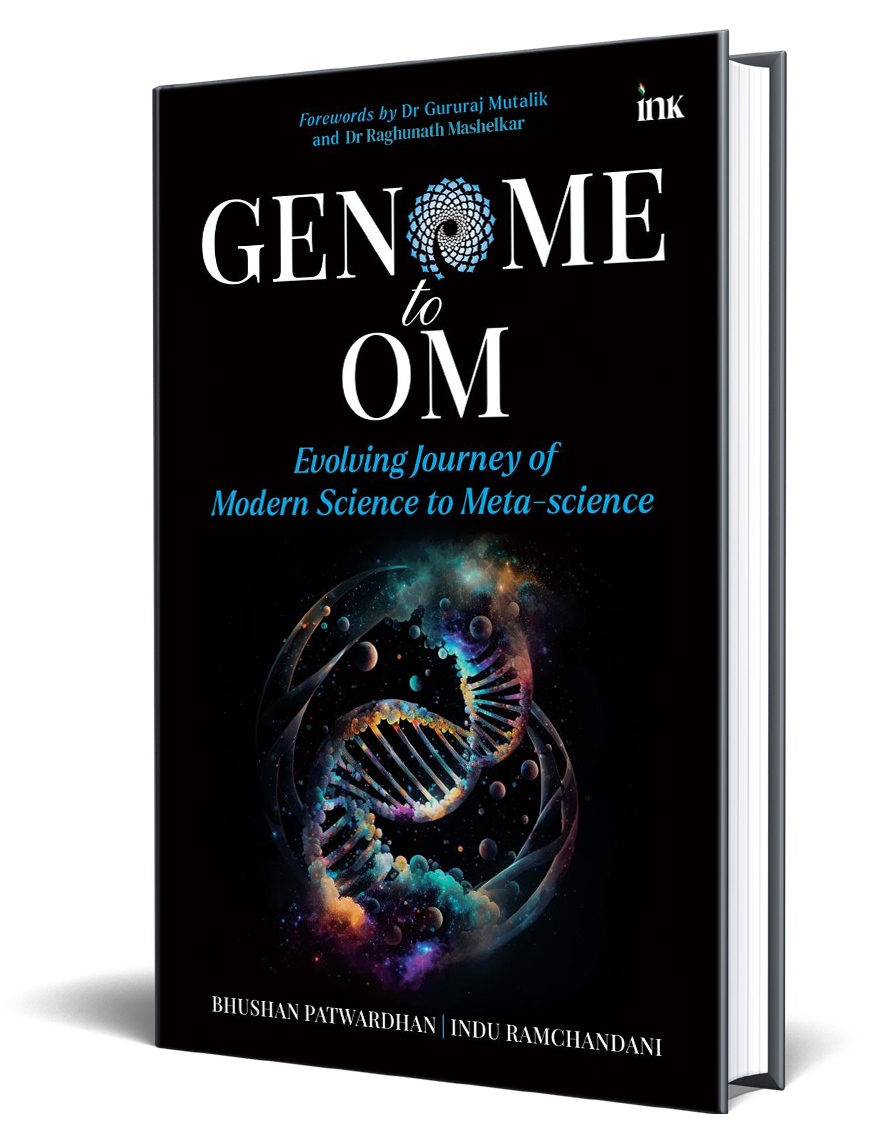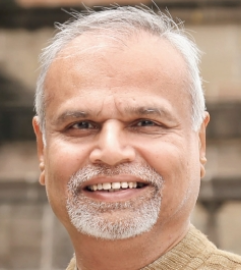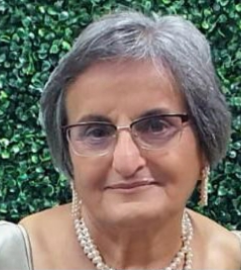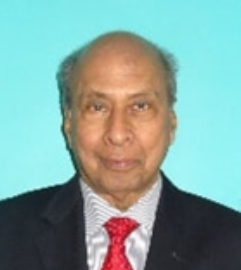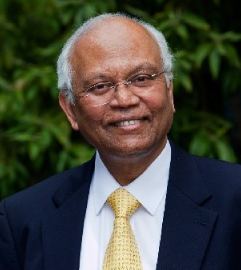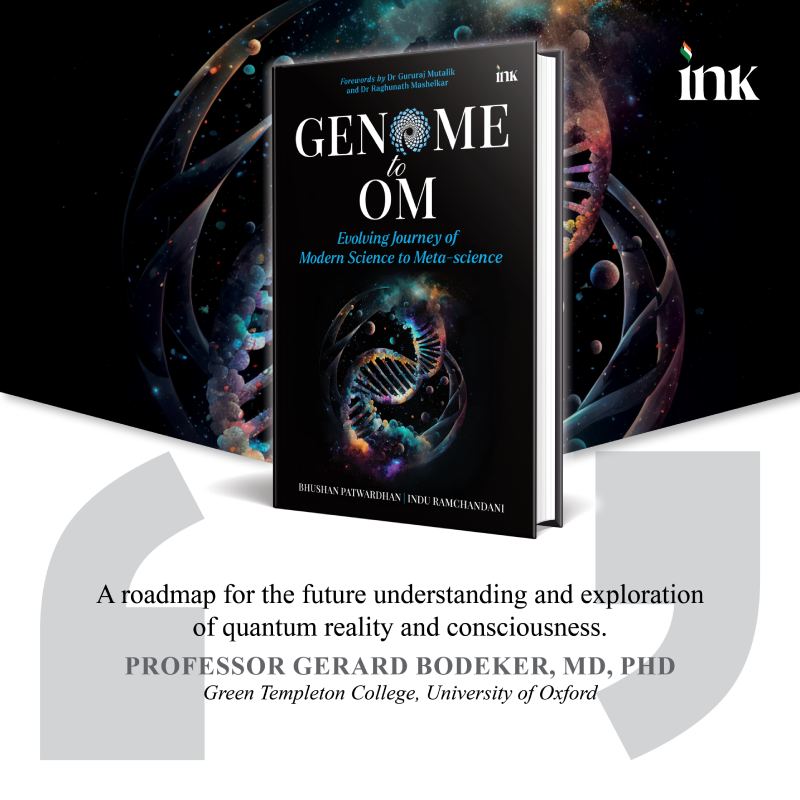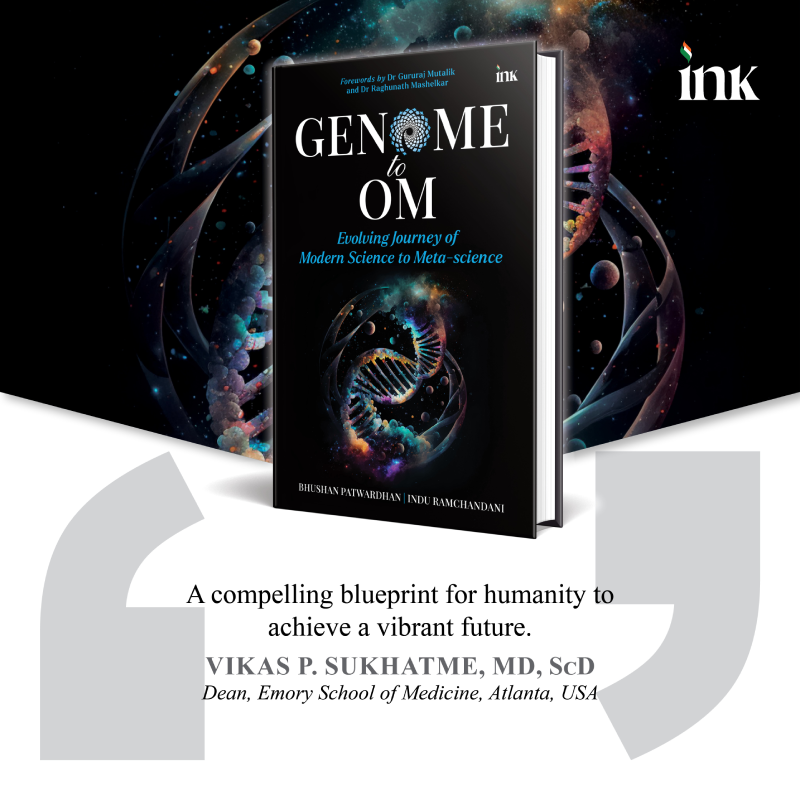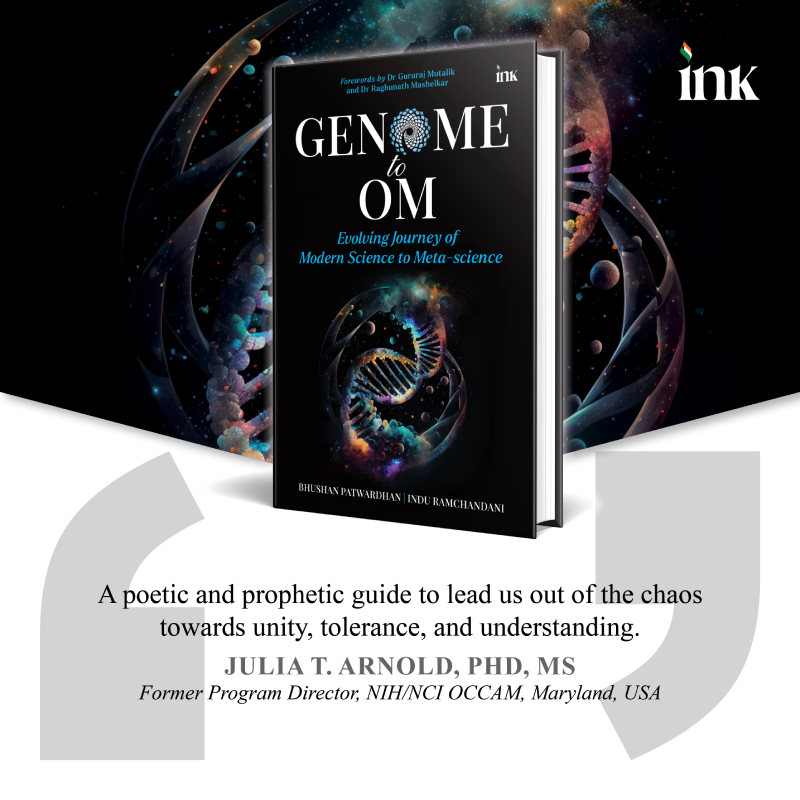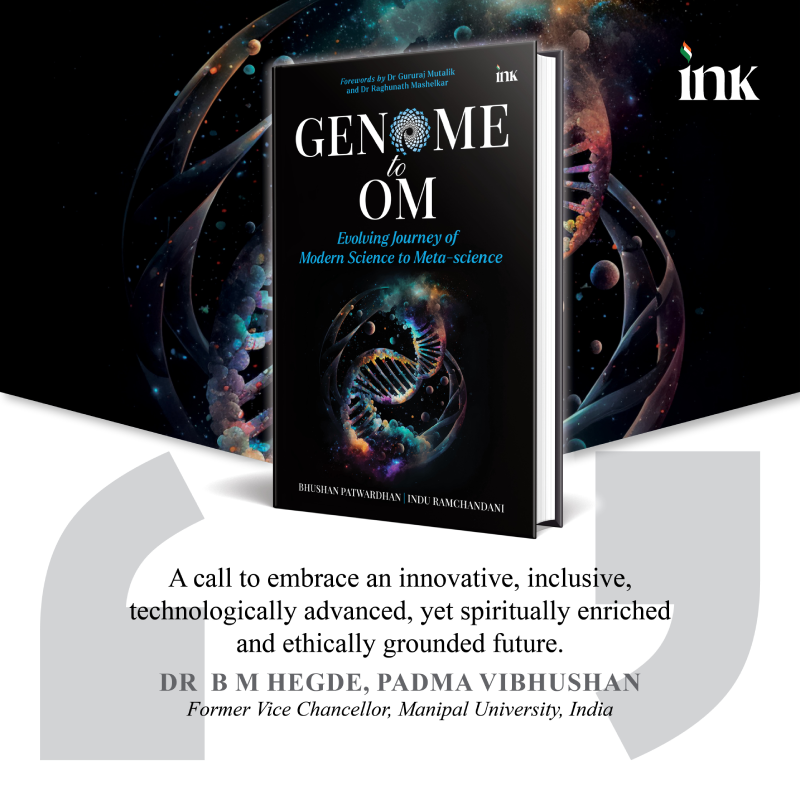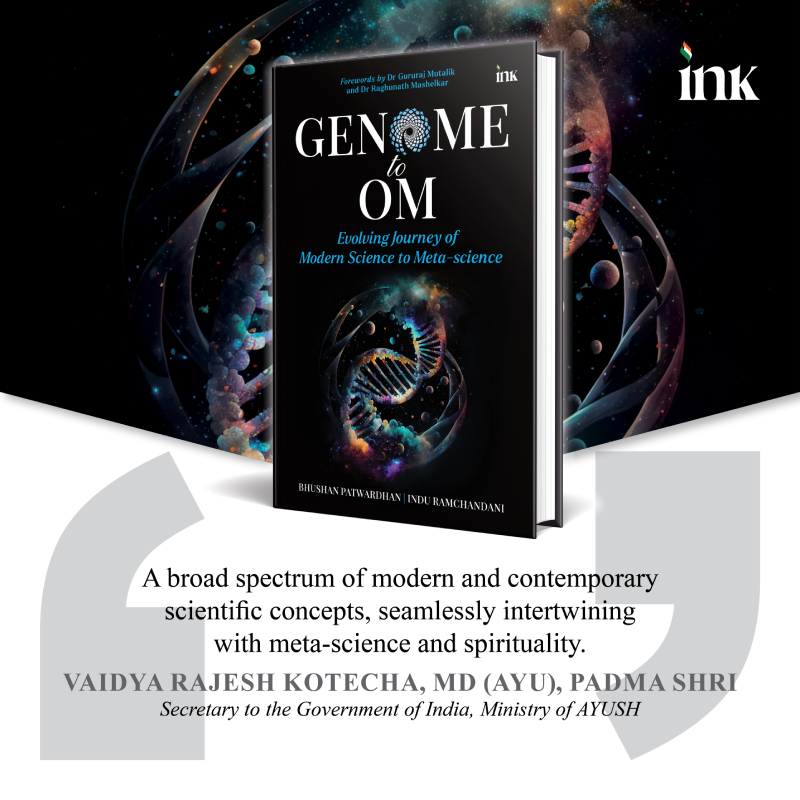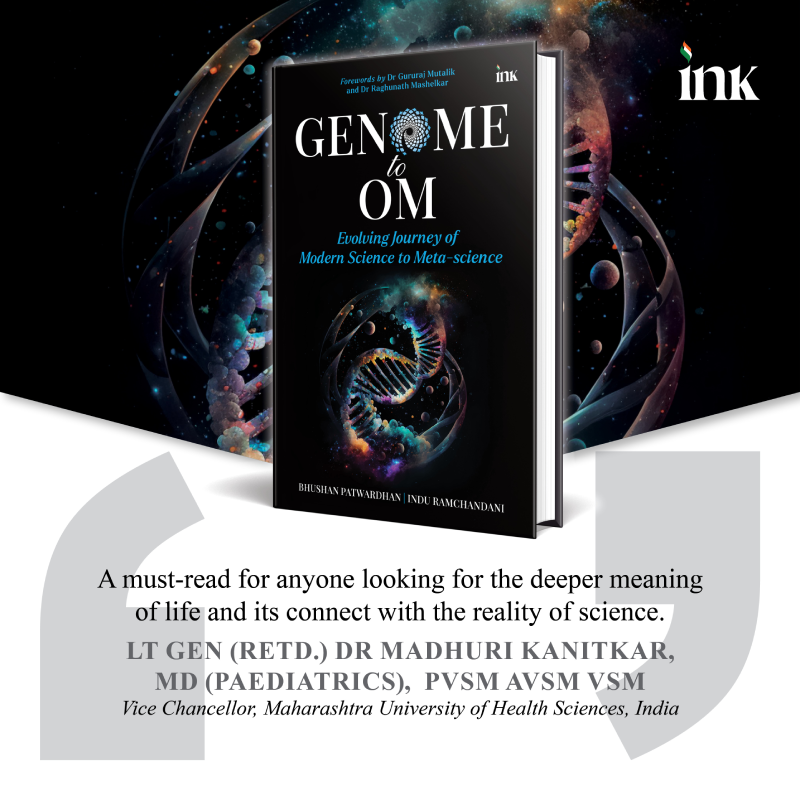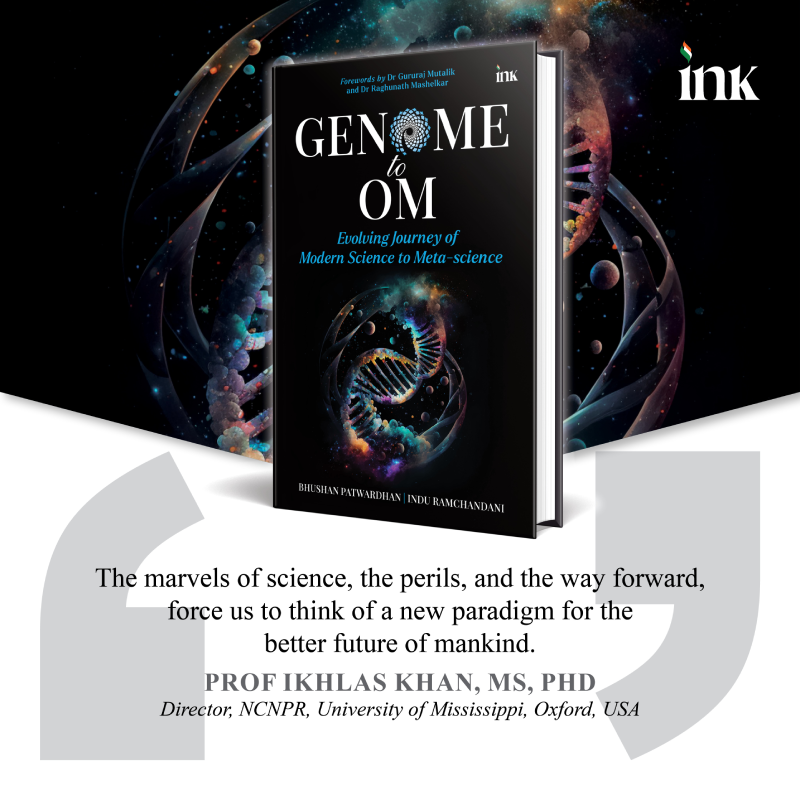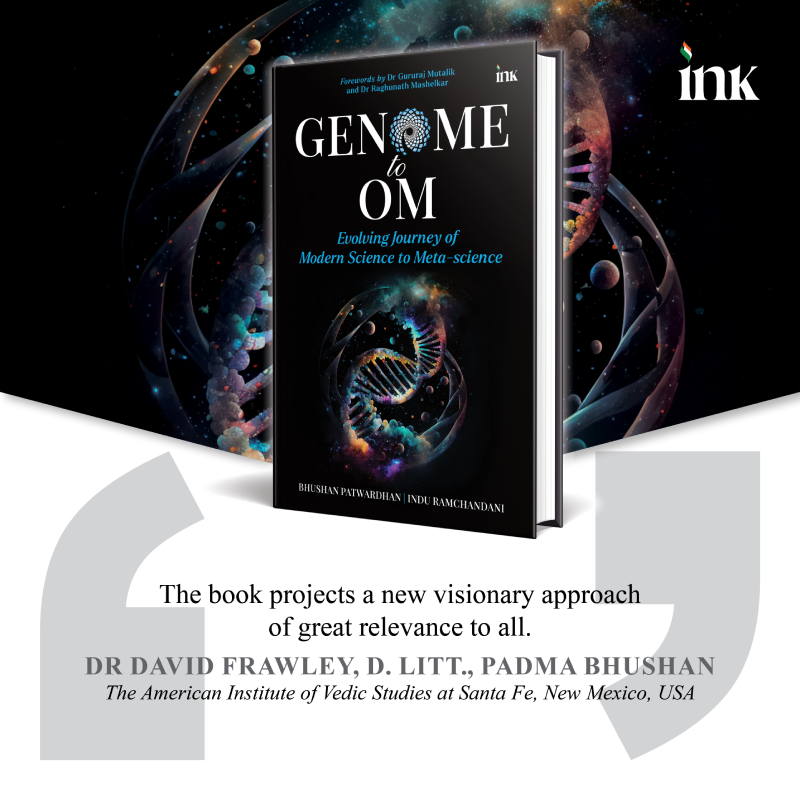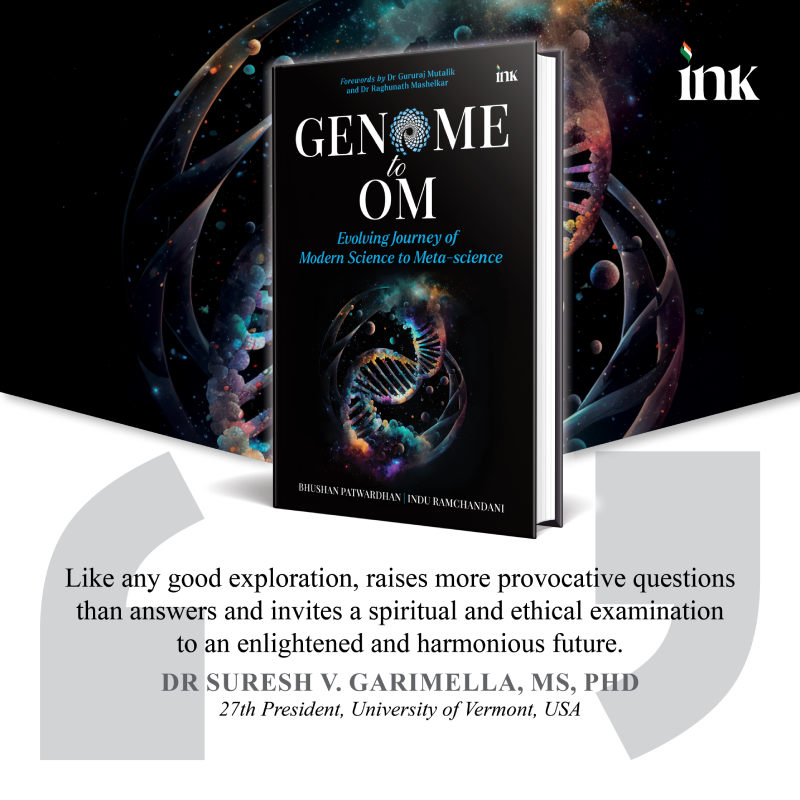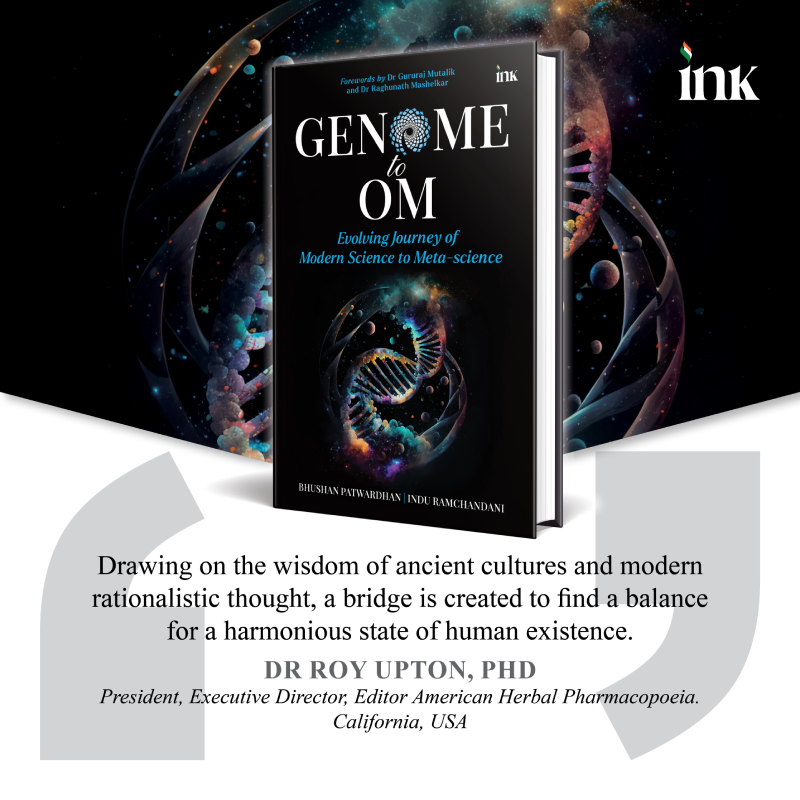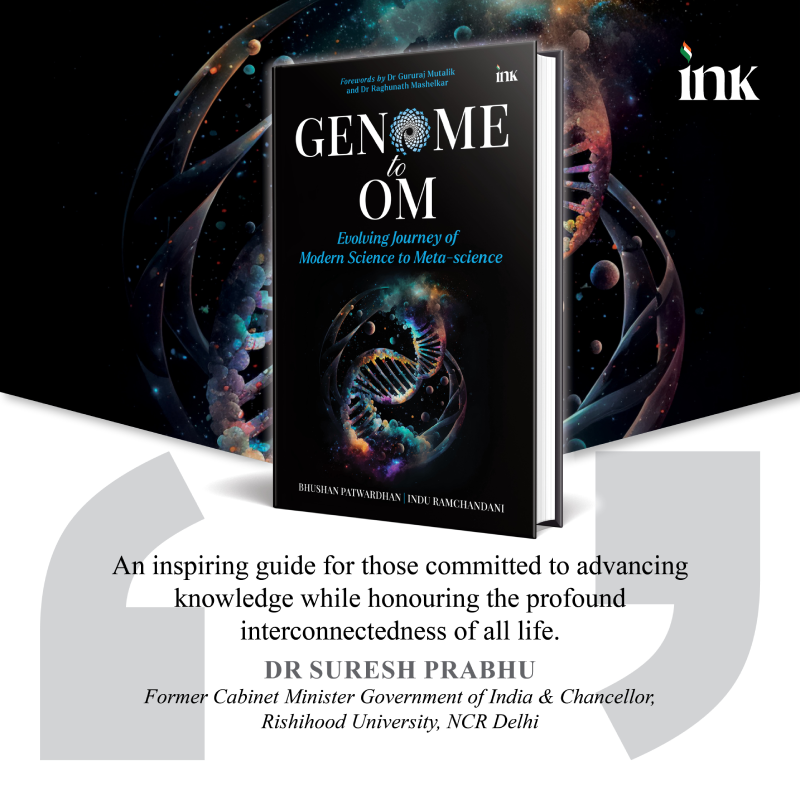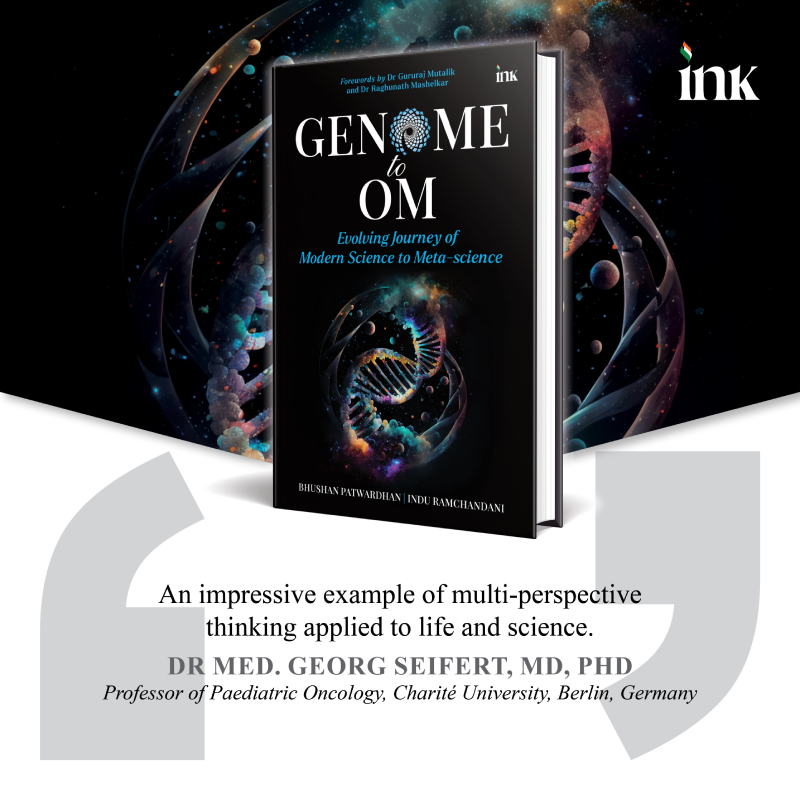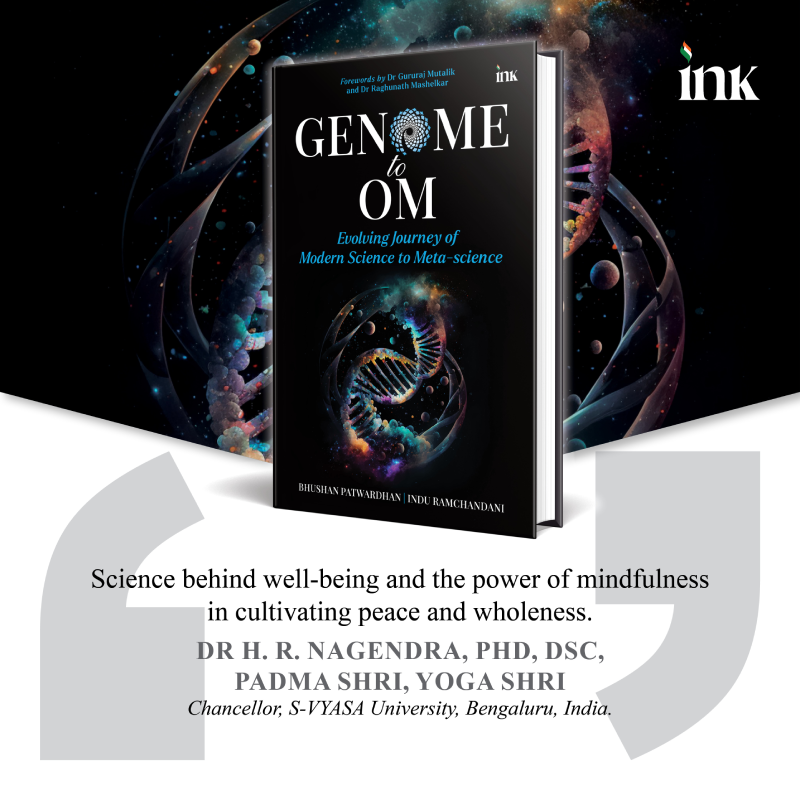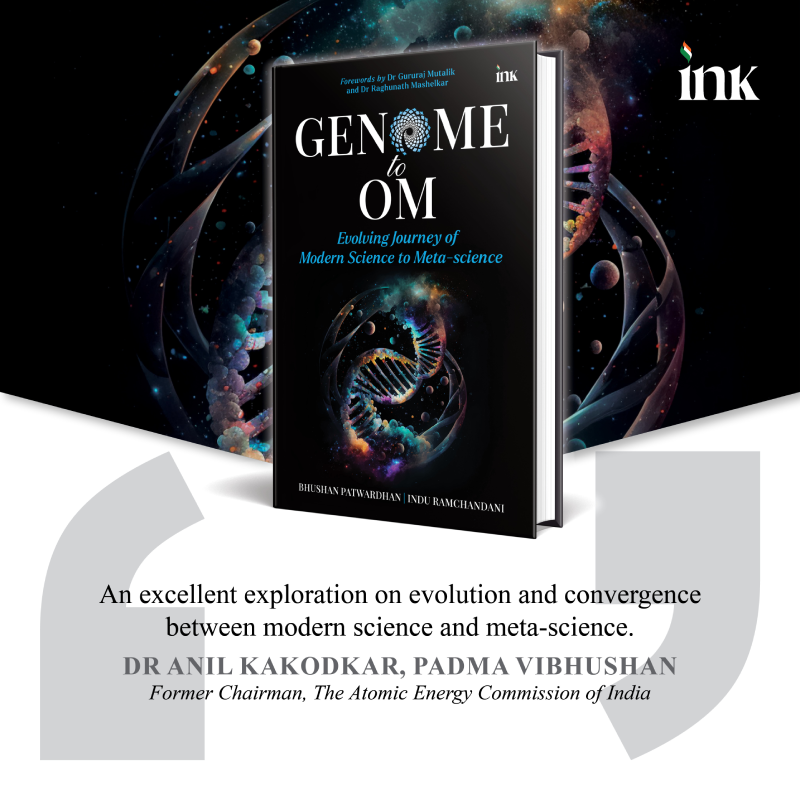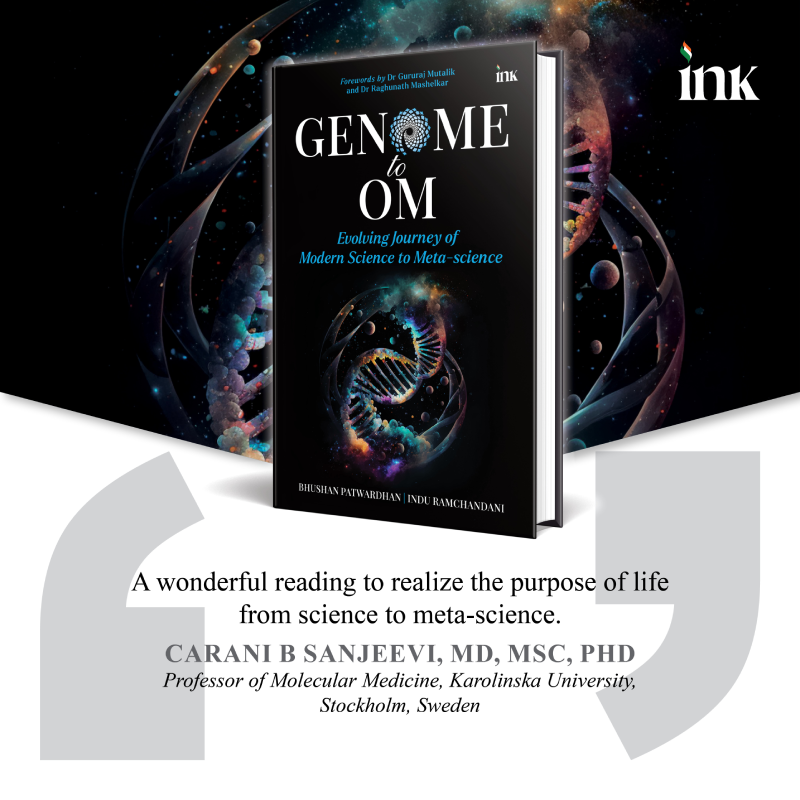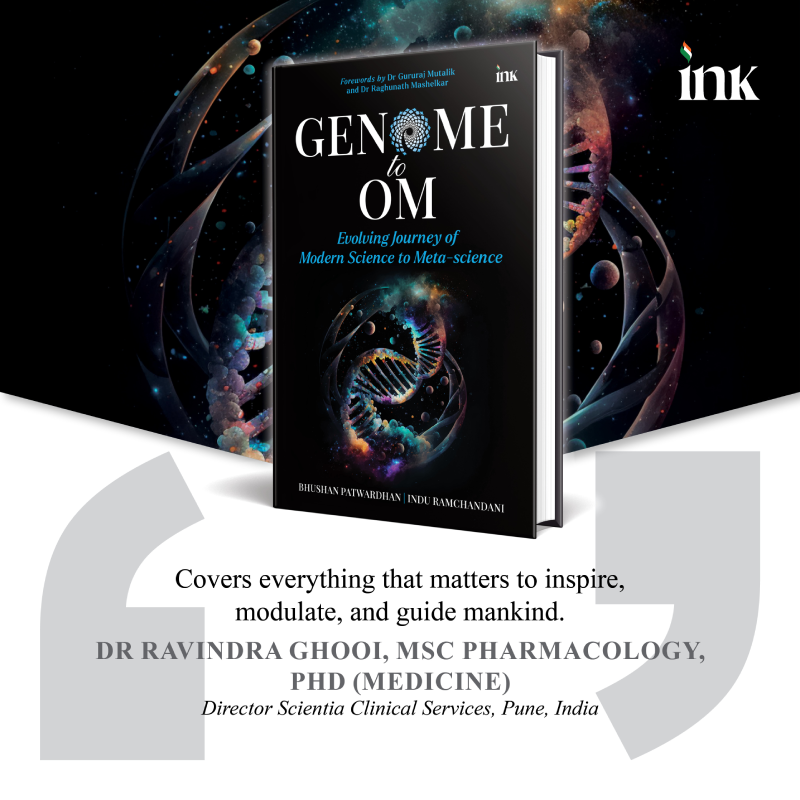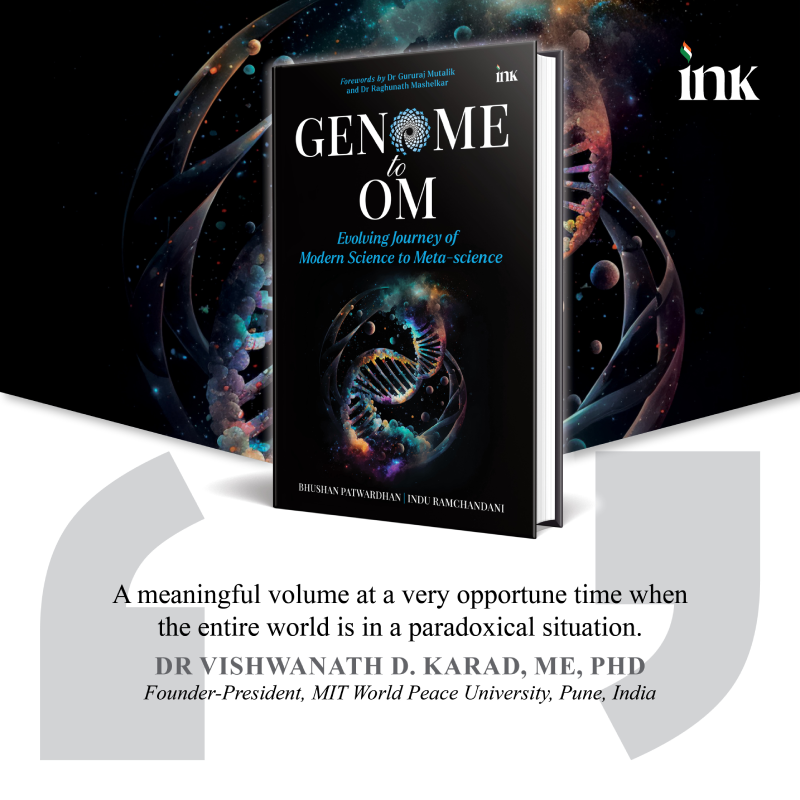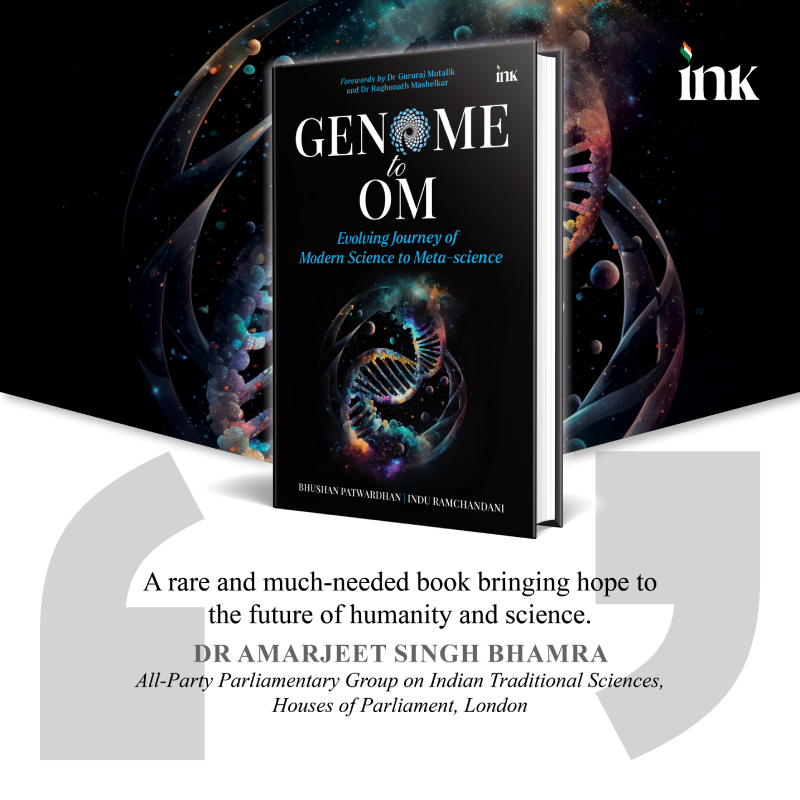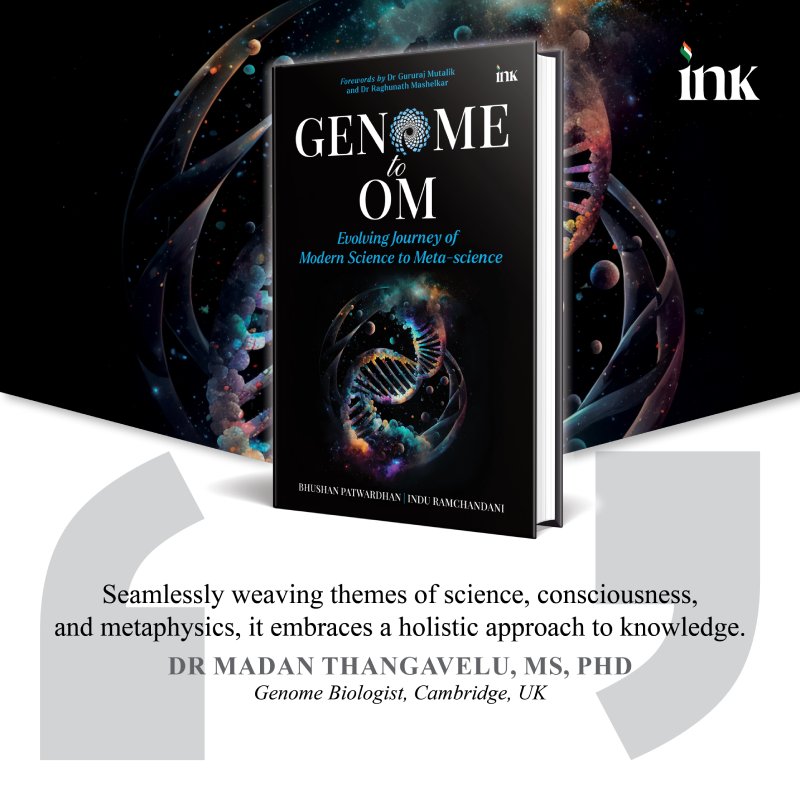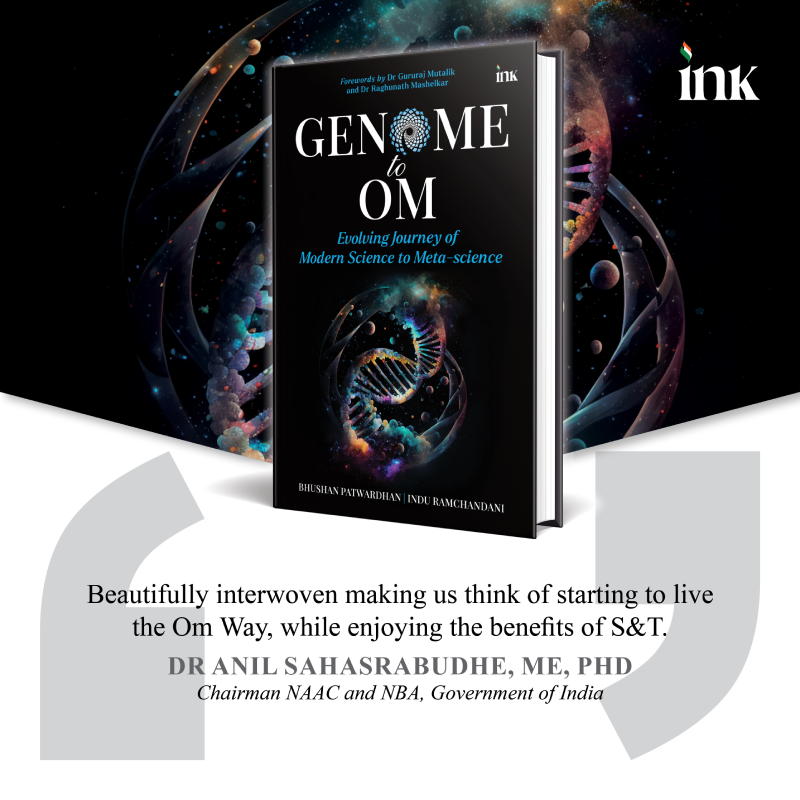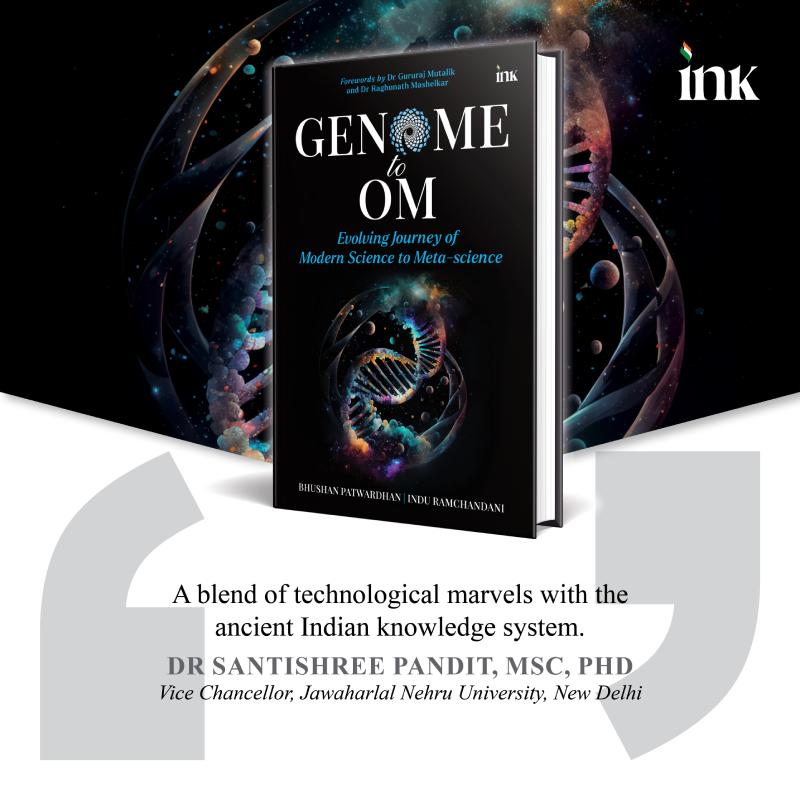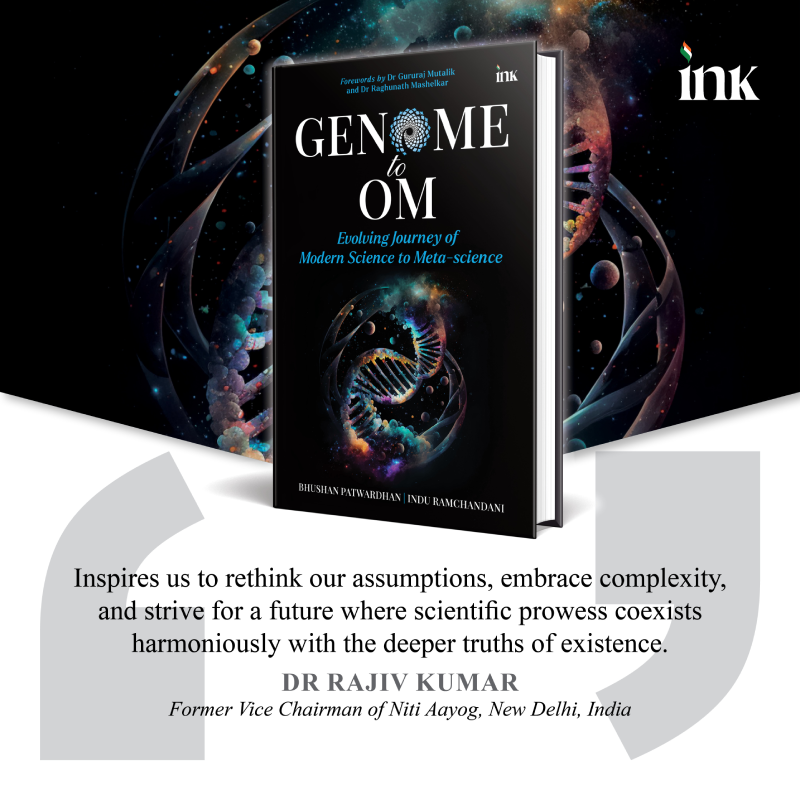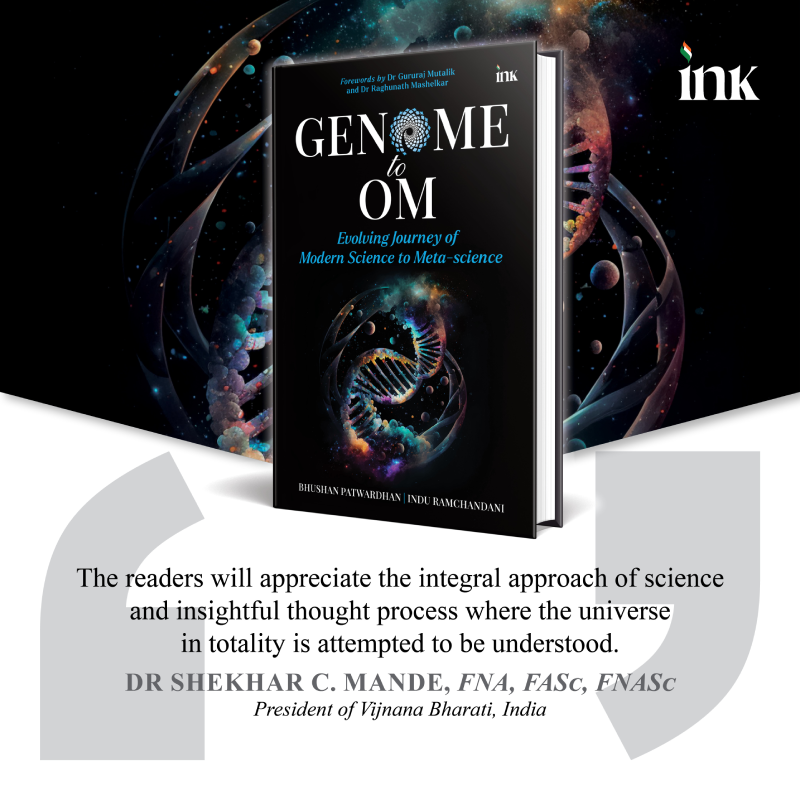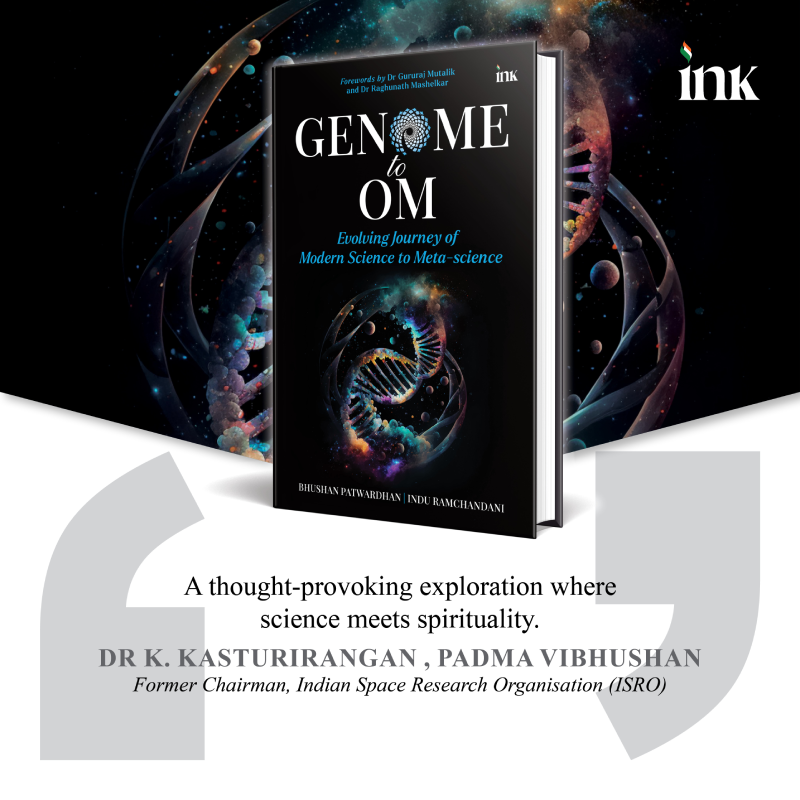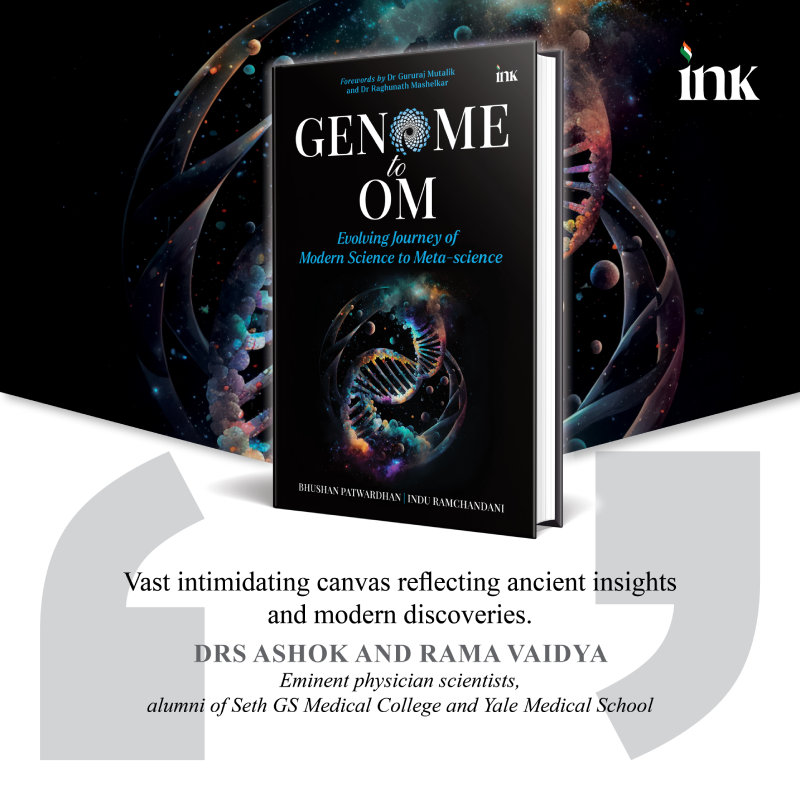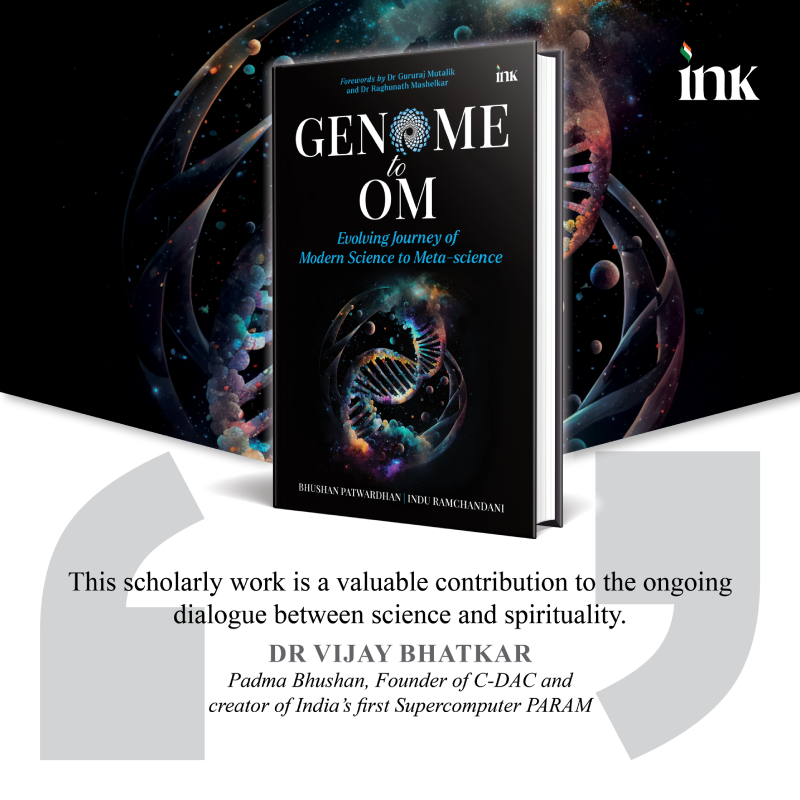ENDORSEMENTS
A thought-provoking exploration of the frontiers where science meets spirituality. Genome to Om challenges our assumptions and pushes the boundaries of knowledge. A must-read for anyone curious about the future of scientific inquiry. The authors state in the Prologue their position on the evolving journey of modern science to meta-science. They discuss a wide range of topics from the marvels and perils of S&T to the story of creation of the universe and humanity. Genome to Om unifies the nine chapters as the thread that links the reality of the world we live in and the challenges we face, as represented by Genome, which can only be resolved by realizing the true identity, with Om. Overall, the book tries to show areas of future collaborations where the confluence of science and spirituality can play a major role. While the authors have relied on knowledge from the Vedic systems, they have remained balanced with due recognition to knowledge sources from other cultures and civilizations across the world. They introduce an interesting concept of the Omcene, the future epoch, with the utopian but feasible goal of a global meta-society focused on universal well-being, finding unity in diversity. A timely endeavour in a world being torn apart by wars, disease, and distrust.
Dr. K. Kasturirangan, PhD, Padma Vibhushan
Former Chairman, Indian Space Research Organisation; Former Director, Emeritus Professor, National Institute of Advanced Studies, Bengaluru, India. Chairman, National Education Policy Committee, 2020, Government of India.
Genome To Om: Evolving Journey of Modern Science to Meta-science is a landmark book bridging 21st-century science with the deep foundations of India’s insight-based Vedic tradition — both approaches shown here to characterise the same reality. Quantum reality is, in the thesis of this book, a field of consciousness that is expressed at every level of manifest life, with its core master code being the genome. The Oxford mathematician and Nobel Laureate, Roger Penrose, has argued that quantum mechanics plays an essential role in the understanding of human consciousness. A central conundrum concerning the thesis of this book is whether the brain gives rise to consciousness or whether consciousness gives rise to the brain and all matter. In the latter view, consciousness is an attribute of the quantum field and, in turn, infuses all matter. If, as is the view of inflationary cosmology, energy precedes matter, and if consciousness is energy, then consciousness can be understood to be the foundation of all matter. And if, on the other hand, one did not “come before the other”, and all particles since the beginning of time have always had both mass and energy, then consciousness, an attribute of material life, must have been present in the interchanging reality of particles and waves and been either the source of matter or the foundational feature of matter. This is what Genome to Om leads us to in exploring ancient Vedic understanding of consciousness and, indeed, its structure on both the individual and the universal level. What may be un-computable by current means, was accessed by technologies of consciousness developed and shared by early Vedic seers who were able to establish their awareness on the level of the quantum field and describe its structure and dynamics from direct observation and experience. The remarkable journey from the genome back to the quantum expression of consciousness, the universal sound or hum, Om, is expertly led by the two authors who are deeply immersed in both the science and heritage of their subject. This remarkable book offers a roadmap for the future understanding and exploration of both quantum reality and consciousness and, indeed, its computability by quantum standards. This is a book for our time.
Dr Gerard Bodeker, MD, PhD
Eminent public health expert, Green Templeton College, University of Oxford,
Adjunct Professor of Epidemiology at Columbia University, and Chair Advisory Group, Western Sydney University, Australia. Editor-in-Chief, The WHO Global Atlas of Traditional and Complementary Medicine.
Genome to Om is a veritable tour de force, an encyclopedic and thought-provoking view of the interface of science and spirituality. It presents a compelling blueprint for humanity to achieve a bright and vibrant future.
Dr Vikas P Sukhatme, MD, ScD
Dean, Emory School of Medicine and Robert W. Woodruff Professor of Medicine, Founding Director, Morningside Center for Innovative and Affordable Medicine. Chief Academic Officer, Emory Healthcare; Formerly Faculty Dean for Academic Programs, Beth Israel Deaconess Medical Center, Harvard Medical School, Boston, USA.
Genome to Om is a brilliant treatise of science, philosophy, psychology, and spirituality. It explores the evolution of science and technology towards a meta-scientific awareness of one’s Self and the lofty goal of “an era where science and spirituality coalesce for the universal good.” “Meta-science helps us to transcend beyond conventional scientific inquiry expanding its scope to integrate subjective human experience, intuition, and the role of consciousness into scientific discovery.” The authors convey their deep experience in scientific discovery and personal journeys in psychology and spirituality. They take us on an intellectual journey into philosophical and spiritual aspects of existence, consciousness, and the nature of reality. They interweave inspiration from Vedic knowledge including the Upanishads and the Bhagavad Gita. They illustrate how the growth of scientific knowledge and discoveries needs a parallel growth and evolution of human consciousness and self-realization. Practices of yoga and meditation offer experiences of the transcendental nature of life and provide perspectives of purpose and fulfilment. The journey in reading this work leads us to appreciate the potential of meta-science as a holistic approach to scientific inquiry, blending ethical, moral, intuitive, and spiritual insights. The book is a poetic and prophetic guide to lead us out of the chaos of today’s world towards a future of unity, tolerance, and understanding
Dr Julia T Arnold, PhD, MS
Senior Cancer Researcher, Former Program Director and Special Volunteer, NCI Office of Cancer Complementary and Alternative Medicine, National Institutes of Health, Maryland, USA.
My dear friend Bhushan Patwardhan has been doing great work for many years. Genome to Om is another feather in his cap. This book, co-authored by him and Indu Ramchandani, is a call to embrace an innovative, inclusive, technologically advanced, yet spiritually enriched and ethically grounded future. It is closely aligned with my views and work. I wish this endeavour great success.
Dr B M Hegde, Padma Vibhushan.
MD, MRCP (UK), FRCP (Lond, Edin, Glasg, & Dublin), FACC (USA), PhD (Hon Causa), FAMS.
Former Vice Chancellor, and Professor of Cardiology, Manipal Academy of Higher Education, Manipal, India
Modern science, based on Cartesian thinking, has produced an enormous amount of knowledge and incredible technological progress, which has led to the emergence of the technosphere as a new dimension alongside the classical realms (earth, plants, animals, and humans). The focus is on the direct cause-effect principle, mechanistic details and experiments, while the consciousness of humans as observers is often disregarded or explicitly excluded. As conscious scientists, we therefore study consciousness, which, however, cannot simply be explained in scientific terms. Ethics, morality, and mental and spiritual phenomena are not easy to grasp in this one-dimensional model and thinking, which underlies the technosphere; it has undoubtedly brought progress, but it has also contributed to the world facing its poli-crises, which cannot be solved by the same way of thinking. If we do the same thing over and over again, we should not be surprised that we always get the same result. Therefore, there is an urgent need to develop new models of thinking that meet the current challenges. These models must consider ethical, moral and spiritual insights and respect the interconnectedness of all aspects of life to catalyse a transformation towards multi-perspective thinking. This thinking forms the basis for what the authors call meta-science. In this book, the authors provide an impressive example of how multi-perspective thinking or meta-science can be applied to different areas of life and science. Their findings, based on multi-perspective thinking, can form the basis for urgently needed transformation processes. The wide variety of topics covered shows that this thinking can be applied to all areas of life and science and can lead to amazing insights. It is a courageous attempt resulting in an impressive outcome.
Dr med Georg Seifert, MD, PhD
Specialized physician for Integrative Medicine, Professor of Paediatric Oncology and Haematology, Berlin Center for Rare Diseases, Charité University, Berlin, Germany.
Genome to Om is an insightful book exploring the intersection of science and spirituality, particularly how yoga, including meditation, can influence our genes and well-being. Authored by Professor Patwardhan, a pioneer in AyuGenomics research, and his co-author Indu Ramchandani, the book links the Ayurvedic concept of Prakriti with modern science, advocating for the evolution of science into a meta-science termed Prajnana. As someone dedicated to scientific exploration at NASA and now as Chancellor of S-VYASA university, I find Genome to Om compelling in its perspective on combining science with Vedic wisdom contained in the concept of Pancha Kosha, the five layers of human existence. While science has tracked the physical world by unravelling the secret of energy as the structure and classical mechanics and quantum mechanics as the laws of the physical universe, it is now moving to unearth the subtle and causal dimensions of the universe. According to Vedic tradition, the creation is featured by five layers starting from the physical universe Annamaya kosha (energy field), Pranamaya (bio-plasmic genomic field), Manomaya (astral field), Vijnanamaya (information and intellectual field), and the most encompassing Anandamaya (bliss field). The genomic knowledge contained in this book is taking science towards understanding the Pranic field. Vedic wisdom further directs as to how the four streams of yoga including Jnana, Raja, Bhakti, and Karma Yoga can positively affect these fields, leading to holistic well-being. By understanding and nurturing each of these fields, individuals can deal with modern NCDs effectively by achieving a balanced and harmonious state of health, integrating physical, mental, and spiritual dimensions. The book draws on the latest scientific research to highlight the significant impact of yoga on physical and mental health. Its engaging writing makes complex topics accessible to both those with a scientific background and those seeking deeper life understanding. Additionally, Genome to Om emphasizes the importance of Yoga as a science of holistic living in daily life and presents practical techniques for integrating these practices. It underscores the potential for personal transformation and the cultivation of inner peace, and blissful awareness through consistent practice of an integrated approach of yoga practices. I highly recommend Genome to Om to anyone interested in the science behind well-being and the power of mindful practices in cultivating peace and wholeness.
Dr H R Nagendra, PhD, DSc, Padma Shri, Yoga Shri
Chancellor, Swami Vivekananda Yoga Anusandhana Samsthana University (S-VYASA University), Bengaluru, India. Acclaimed Yoga Guru and pioneer of cyclic meditation.
On a quick read of the book, I found it to be quite compelling. It delves into a broad spectrum of modern and contemporary scientific concepts, seamlessly intertwining them with metascience, spirituality, and the notions of the microcosm and macrocosm. As I progressed through the text, I felt that as we advance in our quest for knowledge, the divide between the conscious and subconscious will diminish; realism and anti-realism are just a matter of how much we know today, it's like mirroring the unity between science and metascience. The exploration knows no bounds, like the diverse darshanas found in Indian philosophies. Particularly captivating is the discussion on genetics, which resonates deeply with ancient Ayurvedic texts such as the Charak Yajja, Purushiya, and Katidha Purushiyam Shareeram chapters. It illuminates how our ancestors intricately captured genetic principles long before modern science. The book compellingly portrays a historical narrative, while reading I was thinking how in the past, science, philosophy, culture, and spirituality were intricately interwoven, mutually enriching each other and evolving. This is evident in various texts of Ayurveda from different eras and the intellectual discourse (Tad vidh sambhashas) held during those times. However, this harmonious interplay was disrupted by the downfall of kingdoms, and wars, and a new reductionist approach to science possibly emerged during the Renaissance period. Despite this shift, as our understanding of science continues to evolve, we find striking similarities with the holistic approach of the past. I believe it would greatly benefit students of Ayurveda, especially when studied alongside Padarth Vigyan. The title, Genome to Om, encapsulates the essence of the book intriguingly, like the seven stages of life, we are also heading toward where we have started!
Vaidya Rajesh Kotecha, MD (Ayu), Padma Shri
Secretary to the Government of India, Ministry of AYUSH
Former Vice Chancellor, Gujarat Ayurveda University, Jamnagar, India
Ayurgenomics, which explores and synthesizes Ayurveda with genomics, is a budding discipline in social sciences. Through Genome to Om, the authors seek to blend technological marvels with the ancient Indian knowledge system and offer a roadmap for physical and spiritual peace and harmony for the diverse and often conflictual global community. My warm greetings and best wishes to Shri Patwardhan and Indu Ramchandani for this timely endeavour.
Dr Santishree Pandit, MSc, PhD
Vice Chancellor, Jawaharlal Nehru University, New Delhi; Professor of Political Science, Savitribai Phule Pune University India.
The book, Genome to Om, written by Prof. Bhushan Patwardhan and Indu Ramchandani delves deep into the basis of living, to the meaning of life and its origins. Is Cell the basis of life? Paul Nurse, the British geneticist, won the Nobel Prize for Medicine in 2001 for the discovery of protein molecules that control the division of cells in the cell cycle. In his book, What is Life, he describes the nature of Life as exemplified in a cell. He describes the Cell as the fundamental basis for life. Can Cell be compared to the Cosmos? The cytoplasm is an important constituent inside the Cell. The cytoplasm moves inside the cell in an anti-clockwise manner and around the nucleus like the planets going around the Sun. So, the cell is basically the cosmos in a miniature form. Every cell of the body is a universe by itself. Going deeper into the cell, the Genome of the cell, which encodes all the information needed for the functioning of the cell, is highly complex and functions efficiently with so many structures working in unison to keep the cell alive, very much like the cosmos. We haven’t yet figured out how this whole process works whether it is the cell or the cosmos. ‘Om’ is the primordial sound of the Cosmos, which pervades the universe. ‘Om’ allows us to explore the inner reality, which is important for the realization of self. The microcosm and macrocosm are explained very well in the book and that we are in one continuum. There is a quote in the Bhagavad Gita which says “Anoraneeyan Mahato Maheeyan” which means “God exists everywhere and manifests Himself as both the infinitesimal and the Infinite.” In other words, God pervades everything from the micro (atom) to the macro and to infinity. This book makes a wonderful reading and leads us to realize the purpose of life from science to meta-science.
Dr Carani B Sanjeevi, MD (Medicine), MSc, PhD
Professor of Molecular Medicine, Department of Medicine, Karolinska Institute
Karolinska University Hospital, Stockholm, Sweden. Former Vice-Chancellor, Sri Sathya Sai Institute of Higher Learning (Deemed University), Andhra Pradesh, India.
The book, Genome to Om, is a journey of the mind of the author Dr Bhushan Patwardhan who seeks answers to the greater meaning of life. I would add that Om is in fact at the core of the genOMe! As scientists we are looking out for evidence-based answers to the questions of health and life, however we reach a dead end when it comes to the role of science in giving us answers towards the bigger picture of life. We often wonder as to where am I going in this journey in search of the meaning of life itself? KuhayA Aham? This book raises a number of questions for which some answers are provided on the spiritual and philosophical level while remaining in contact with the reality of science. The co-author, Indu Ramchandani, brings in a rich literary experience to the book. I have known Dr Patwardhan personally as a learned friend who has always gone beyond the borders of disciplines to find solutions to health. This book is a must-read for anyone looking for the deeper meaning of life and its connect with the reality of science.
Dr Lt Gen (Retd) Madhuri Kanitkar, MD (Paediatrics), PVSM AVSM VSM.
Vice Chancellor, Maharashtra University of Health Sciences, India, Former Dean and Professor of Pediatrics, Armed Forces Medical College, Pune, India.
If there is a single word that has the deepest meaning in Hindu Philosophy, it is ‘Om’, which represents “everything there is”. Recordings of the sounds of space, that reverberate through the universe, closely resemble the sound of ‘Aum’. It is the most appropriate symbol to represent the Grand Unification of force and matter. The universe is much older than life, in fact it provided the required conditions for the creation of life. The entity that encodes life is the Genome. Even if all life were to be destroyed, the Genome would be the seed to restart it, when conditions are favourable. Thus, on the one hand, we have Om, which represents everything and on the other, we have the Genome, representing life. These two, Om and the Genome, cover everything that matters, at least to us, living beings. We have come a long way in evolution, taking millions of years from the cells in the primordial soup. Our progress has been delineated, step-by-step by the work of numerous scientists “by standing on the shoulders of giants”. Many of the gadgets, instruments, and appliances that we see around us, did not exist before our birth. Functions that were done manually are now automated, and this is taking place at a much faster rate. “Genome to Om” covers all this. It is said that the Industrial Revolution has not ended, but its influence has reduced considerably, and the Intellectual Revolution has begun. In the 21st century, the world will run more on intelligence than industry, and in the next century, the transformation will be complete. It isn’t that everyone will be working with AI and ML, but major changes in the world will depend upon the intelligence of machines and not man. To what extent the world will change, is difficult to forecast. Yet one thing shall remain constant, our study of the Genome and our philosophy of Om. These two phenomena will continue to inspire, modulate and guide mankind.
Dr Ravindra Ghooi, MSc Pharmacology, PhD (Medicine)
Director Scientia Clinical Services, Former Professor of Pharmacology, Symbiosis International University, Chairman Ethics Committee, Sahyadri Clinical Research and Development Centre, Pune, India
This book links historical science and knowledge to the present time. Genome to Om certainly sheds light on the marvels of science, the perils, and the way forward, and forces all of us to think of a new paradigm that can herald a better future for the benefit of mankind.
Dr Ikhlas Khan, MS, PhD
Director, The National Center for Natural Products Research, Distinguished Professor; Research Professor of Pharmacognosy University of Mississippi, Oxford, USA.
I congratulate my colleague and friend, Dr Bhushan Patwardhan, on his monumental work representing the work of a lifetime by a scholar, thinker, and humanist. It is not easy to bridge the worlds of science and spirituality, but what sets this book apart is the care with which Dr Patwardhan makes a clearly demarcated reference to each. He goes to great lengths to explain the historic development as well as future pathways for a veritable kaleidoscope of ideas in science (with the Genome as proxy), replete with extensive sourcing. In this effort, the work of a brilliant scientist and scholar shines through. When he moves to spirituality (the Om part of the book) and offers thoughts on nurturing an ethically grounded ‘meta-society’ of the future, he draws primarily on a vast trove of Vedic and Upanishadic references as well as those from across cultures and traditions. Co-author Indu Ramchandani adds important contributions, drawing on her own background and scholarship, to the Vedic and Upanishadic materials included in this book. The almost impossibly wide canvas the book covers is breathtaking – from the origins of the Universe, through ancient civilizations, to the very latest developments in artificial intelligence, quantum computing, and medicine, weaving the story of the human species along with the harms our endeavors have caused to people and planet, and offering a peek into the future including that of multiverses. At its core, the book is an exhortation to transcend narrow problem-solving in the here and now, and the perils of the misuse of scientific and technological development, to a deeper understanding of the wider context in which we live. Like any good exploration, it raises more provocative questions than answers and invites a spiritual and ethical examination – a contemplative inquiry – of our very existence and a path leading to a more enlightened and harmonious future. As I progressed through the first few chapters of the book, I was increasingly reminded of lectures I had heard years ago by Swami Chinmayananda on the concept of Tat Tvam Asi in Adi Sankara’s Vakya Vritti, his condensed introduction to Advaita philosophy. So it was satisfying to see Chapter 4 in the book converge to this teaching. It is difficult to encapsulate in a few words the content of a book so vast and head-spinning in scope, but I predict it will be an enjoyable and fruitful journey for anyone who embarks on it.
Dr Suresh V. Garimella, MS, PhD
Professor of Mechanical Engineering and 27th President of University of Vermont; Distinguished Professor Emeritus, Purdue University, Indiana, USA
Genome to Om, is an excellent exploration on evolution and convergence between modern science and meta-science. One is awestruck with the power of observation and deduction of our sages in ancient times that enabled them to understand ourselves and the nature around us and their efforts to nurture schools of learning. That seems to have enabled them to conceptualise some of the deepest questions that modern science is still struggling to resolve. Authors Bhushan Patwardhan and Indu Ramchandani deserve our deep appreciation for their efforts in unfolding this journey. My compliments to the authors for putting together this book, it makes a fascinating reading on discovery efforts from ancient to modern times.
Dr Anil Kakodkar, D.Sc., D.Litt. Padma Vibhushan
Former Chairman of the Atomic Energy Commission of India; former Secretary to the Government of India; and former Director of the Bhabha Atomic Research Centre. Chancellor, Homi Bhabha National Institute (Deemed to be University), Mumbai, India
Genome to Om, by Dr Bhushan Patwardhan and Indu Ramchandani, takes us from the cutting edge of modern science to the timeless Vedic sciences of Yoga and Ayurveda, which reflect a higher spiritual science of universal consciousness and prana rooted in prime mantric knowledge starting with ‘Om’. This can heal body and mind and unify society promoting world peace and prosperity. The book projects a new visionary approach of great relevance to all.
Dr David Frawley, D. Litt. Padma Bhushan
Vedacharya, Pandit Vamadeva Shastri, Founder Director, American Institute of Vedic Studies, Santa Fe, New Mexico, USA.
When I first studied Ayurveda, our senior instructors spoke of the various levels of knowledge, which arise from human experience and others as induced through critical observation and experimentation. Post-Baconian inductive reasoning caused most in modern Western scientific thought to focus only on the latter, losing sight of the potential that both these worldviews may be equally valid. This work attempts to bridge the chasm of these two worldviews. Drawing on the wisdom of ancient cultures and the culture of modern rationalistic thought, a bridge is created that can help find a balance that ultimately leads to a more peaceful and harmonious state of human existence. Critical rationalism of modern science is needed to unravel the many mysteries of knowledge whether in medicine, mathematics, or space travel, which may have influenced modern life disproportionately. The reality of the importance and meaning of human existence; the often immeasurable and uniquely profound experience of being human; of feeling connected, or not, to something greater that is outside of ourselves that depends on faith and a feeling of relationship, connectedness irrespective of its ability to be seen or measured. The authors point in this direction emphatically. In Western materialistic thought, the idea of ‘spirit’, ‘spiritual’, ‘God or ‘gods’ cannot exist because they cannot be materialized in a form that is recognizable in Western science. Yet, the majority of world cultures are steeped in some form of spiritual paradigm based on faith, not inductive reasoning. How can these two world views co-exist for the future benefit of humanity? This is a question that Genome to Om attempts to answer, or at least raises for discussion. Most who are drawn to such conversations understand the value of Western rationalistic thinking to human existence. Conversely, many Western rationalistic thinkers remain unaware of the richness that faith born out of human existence can bring to humanity. After all, perhaps the most profound experience of human existence, Love, can neither be measured nor even proven. This work is an exploration into the two world views.
Dr Roy Upton PhD
President, Executive Director, Editor American Herbal Pharmacopoeia, Director of Herbal Research, Planetary Formulas, Scotts Valley, CA. Adjunct faculty member of the Ric Scalzo Botanical Research Institute, Sonoran University of Health Sciences, Tempe, Arizona, USA
The book, Genome to Om - Evolving Journey of Modern Science to Meta-Science by Bhushan Patwardhan and Indu Ramchandani makes an interesting reading. It is contemporary and modern given the background and understanding of DNA, genome sequencing, research in neuroscience, lifestyle changes, and AI and yet aligned to the ancient wisdom of spiritualism, yoga, meditation, minimalism, honesty, ethics, morality, and the goal to live a healthy and happy life. The text is beautifully interwoven with this complex subject and makes us think of starting to live the Om Way, while enjoying the benefits of Science and Technology, and save the planet from imminent disaster.
Dr Anil Sahasrabudhe, PhD, FINAE
Chairman of the National Education Technology Forum, National Assessment and Accreditation Council, National Board of Accreditation. Formerly, Chairman, All India Council for Technical Education, Government of India.
It is a joy to see this book, Genome to Om. This meaningful volume has been published at a very opportune time when the entire world is in a very paradoxical situation. On the one hand, humanity is enjoying all the luxuries and comforts that emerging technology is providing, while on the other, we are at such a perilous stage that we do not even know whether we will see the end of the 21st century! India is a land of great saints, sages, seers, scientists, and philosophers. It is known as a spiritually oriented country based on the most scientific and logical philosophies propounded by great men of virtue and vision, whose sole aim was the welfare and well-being of the entire mankind and all the living beings at large. They also gave the world some of the greatest attributes, which include spirituality, Yoga, Aum, and nonduality. Until recently, these concepts were considered religious dogmas with no scientific basis, although Einstein’s E = MC2 reflects the manifestation of consciousness — the invisible energy or force, which binds the entire universe together and naturally it symbolizes the ultimate reality, the ultimate truth, the Almighty, God. This shows that science and spirituality go together to reveal the true nature of the universe. I am proud to endorse that Bhushan Patwardhan is one of those philosopher-thinker-scientists, who is deeply involved in the pursuit of understanding the true nature of the universe and he and his co-author, Indu Ramchandani, must be complimented for their diligent effort to reveal the same through this book, Genome to Om. Swami Vivekananda had prophesied, “The union of science and spirituality alone will bring harmony and peace to mankind.”
Dr Vishwanath D. Karad, PhD
UNESCO Chair for Human Rights, Democracy, Peace & Tolerance. Founder President, Maharashtra Institutes of Technology World Peace University (MIT WPU), Pune, India. Formerly Professor of Mechanical Engineering, COEP Technology University, Pune.
Genome to Om is a rare and much-needed book bringing hope to the future of humanity and science. This book provides insights from science, meta-science, ethics and spirituality, acknowledges the interconnectedness of all things, and emphasizes a holistic approach to scientific inquiry understanding life and its pursuits. I feel this is a must-read for everyone.
Amarjeet Singh Bhamra
All Party Parliamentary Group Indian Traditional Sciences, Houses of Parliament, London.
The book, "Genome to Om: Evolving Journey of Modern Science to Meta-science" resonates deeply with the groundbreaking work of Prof. Brian Josephson. Just as his research has pushed the boundaries of our understanding of mind-matter unification, this exploration of the evolutionary journey from modern science to meta-science promises to challenge existing paradigms and inspire new ways of thinking. By seamlessly weaving together themes of science, consciousness, and metaphysics, the text embraces a holistic approach to knowledge. I am excited to see how these insights contribute to the ongoing dialogue surrounding the interconnectedness of science and spirituality. Congratulations to the authors on creating a work that forges new pathways for future scientific inquiry. It is sure to captivate readers and spark meaningful discussions in the realms of academia and beyond.
Dr Madan Thangavelu
Genome Biologist
General Secretary and Research Director of the EUAA – European Ayurveda Association, Cambridge, UK.
One of the most perplexing and profound approaches to the understanding of the world around as practiced over ages in India and associated cultures is fundamentally different from Western philosophy, which emerges from the sound principles of logic. The Indian approach, often considered mystical, does not consider human beings as separate entities from nature. The so-called mysticism has fascinated many philosophers around the world in attempting to understand the holistic nature of the world around us. “Genome to Om” is a well-studied endeavour to address this subject. I am sure that the readers in general will appreciate the integral approach of science and insightful thought process where the universe in totality is attempted to be understood. I congratulate the authors for putting together such a thoughtful text which makes a very interesting reading.
Shekhar C. Mande, FNA, FASc, FNASc
President of Vijnana Bharati.
Distinguished Professor, Bioinformatics Centre,
Savitribai Phule Pune University, Pune 411007 &
JC Bose Fellow and Honorary Distinguished Scientist,
National Centre for Cell Science, Pune, India
Former Director General, Council for Scientific and Industrial Research, and Secretary S&T, Government of India.
"Genome to Om" is a profound exploration of our current scientific landscape and its potential evolution. As we stand at the threshold of a new era shaped by AI, quantum computing, and genetic engineering, this book is a visionary guide, urging us to transcend traditional boundaries of empirical science. At its core lies the concept of meta-science—a holistic approach that integrates ethical, moral, and spiritual dimensions with empirical inquiry. Drawing from ancient wisdom and modern insights, 'Genome to Om' navigates the intricate interplay between scientific progress and human consciousness. It challenges us to consider how we understand the universe and our place within it. Through meticulous scholarship and compelling prose, the authors illuminate the path toward a meta-society that harmonizes technological advancement with timeless values. This book is a manifesto for the future, advocating a balanced integration of cutting-edge innovation and spiritual enlightenment. “Genome to Om” is essential reading for anyone interested in the future of science, humanity, spirituality, and our collective journey toward universal well-being. It inspires us to rethink our assumptions, embrace complexity, and strive for a future where scientific prowess coexists harmoniously with the deeper truths of existence.
Dr Rajiv Kumar
Former Vice Chairman of Niti Aayog.
Chairman, Pahle India Foundation Delhi, India.
"Genome to Om: Evolving Journey of Modern Science to Meta-science" is an insightful book that highlights the need for a holistic approach, including ethical, moral, and spiritual insights. It emphasizes the contemporary value of the Upanishads, Yoga, and other ancient knowledge sources in recalibrating our current development path towards a more sustainable environment, peace, and well-being. This motivates readers to think about how technological progress, combined with timeless values, can lead to a future that is not only innovative but also spiritually enriched and ethically grounded. I wholeheartedly endorse this book and believe it will serve as an inspiring guide for those committed to advancing knowledge while honouring the profound interconnectedness of all life."
Suresh Prabhu
Chancellor, Rishihood University. Former Cabinet Minister Government of India with several portfolios including Environment & Forest, Commerce & Industry, Civil Aviation & Railways.
Vast intimidating canvas reflecting ancient insights and modern discoveries.
Drs Ashok and Rama Vaidya
Eminent physician scientists, alumni of Seth GS Medical College and Yale Medical School
With great enthusiasm, I endorse this insightful book that offers a unique perspective on the intersection of science and spirituality, seamlessly connecting the concepts of Para and Apara vidya with Jnana, Vijnana, and Prajnana. The author masterfully explores how our understanding of genomics and consciousness can lead us from the Anthropocene to the Omcene, a new era of harmony and understanding. The book provides a path to integrating traditional wisdom with modern scientific discoveries, offering practical applications for personal and societal well-being by delving into the Om Way. This scholarly work is a valuable contribution to the ongoing dialogue between science and spirituality, and I highly recommend it to open-minded scientists and intellectually curious readers interested in exploring profound questions about our purpose and existence.
Dr Vijay Bhatkar
Padma Bhushan, Founder of C-DAC and creator of India’s first Supercomputer PARAM
